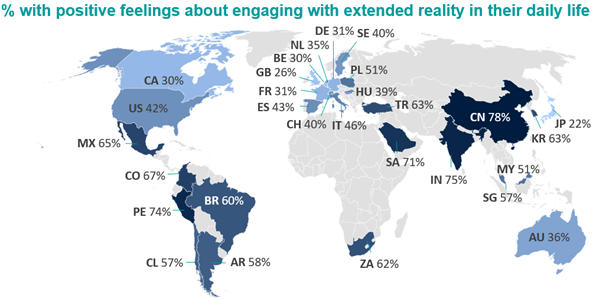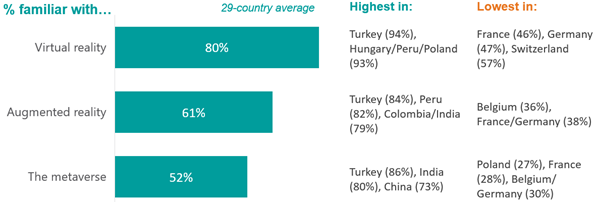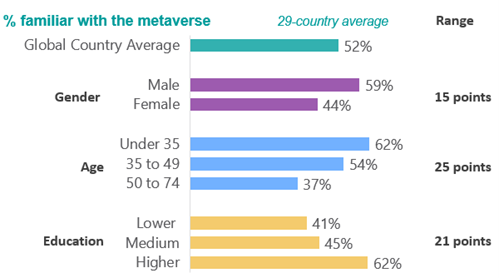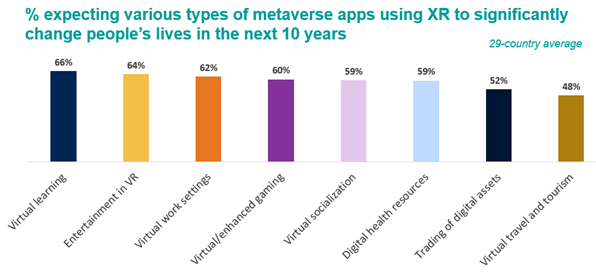Australia lags many countries globally when it comes to awareness and enthusiasm for the metaverse and extended reality
Less than half the Australian population (44%) are familiar with the metaverse, while only 36% express positive feelings about engaging with extended reality in daily life, a new global survey conducted by Ipsos for the World Economic Forum finds. Globally, about half of adults across 29 countries say they are familiar with the metaverse (52%) and 50% have positive feelings about engaging with it.
Key Australian findings include:
- 80% of Australians claim familiarity with virtual reality, while half (51%) say they are familiar with augmented reality
- Across the metaverse, virtual reality, and augmented reality there is a consistent trend of decreasing familiarity with age (although the difference across ages is least for virtual reality), but familiarity increases with household income and education levels
- Interestingly, males hold far more positive feelings towards extended reality than females (42% vs 29% very/somewhat positive).
- As with familiarity, positive feelings towards extended reality decrease with age but increases with income and education.
- Australia is in line with or slightly lower than the 29 country average in terms of our positivity towards each of the metaverse’s applications mentioned in the survey.
- Australians surveyed were most likely to think metaverse applications can significantly impact virtual learning (65%), digital health resources (61%) and digital entertainment in virtual reality (60%) over the next ten years.
Ipsos Australia Director, David Elliott, said: "The findings from this latest Global survey show that Australia is well behind a lot of countries around the globe in terms of our familiarity with extended reality and our feelings towards it. What we know from other research is that a familiarity improves so to does the potential for trust and positivity. As we hear more about these technologies and learn more about them, it is likely we will become more positive about them and their potential to hopefully have a real impact on our lives."
Globally, the survey points to wide differences in familiarity and favourability toward these new technologies across countries and demographic groups.
Excitement about extended reality is significantly higher in emerging countries than it is in most high-income countries. In China, India, Peru, Saudi Arabia, and Colombia, more than two-thirds say they have positive feelings about the possibility of engaging with it. However, it is the case of fewer than one-third in Japan, Great Britain, Belgium, Canada, France, and Germany.

Levels of familiarity with virtual reality, augmented reality, and the metaverse show a similar pattern. More than two-thirds in Turkey, India, China, and South Korea report being at least somewhat familiar with the metaverse, compared to fewer than one-third in Poland, France, Belgium, Germany, and the Netherlands.

Familiarity and favourability towards the new technologies are also significantly higher among younger adults, those with a higher level of education, and men than they are among older adults, those without a university-level education, and women.

Despite significant differences in familiarity and enthusiasm, the global public widely expects that various types of metaverse apps using XR will significantly change people’s lives over the next decade – most of all virtual learning (for a 29-country average of 66%), digital entertainment in virtual reality, and virtual work settings.

Expectations about the impact of metaverse apps also vary by country and by demographic characteristics, following the same pattern as favourability toward extended reality. However, differences are not as sharp, suggesting that, whether they look forward to it or not, most people expect their lives to be profoundly impacted by the new technologies in the coming years.
About the Study
These are the findings of a 29-country Ipsos survey conducted April 22 – May 6, 2022, among 21,005 adults aged 18-74 in the United States, Canada, Malaysia, South Africa, and Turkey, 21-74 in Singapore, and 16-74 in 23 other countries, via Ipsos’s Global Advisor online survey platform.
Each country’s sample consists of ca. 1,000 individuals in each of Australia, Brazil, Canada, China (mainland), France, Germany, Great Britain, Italy, Japan, Spain, and the United States, and ca. 500 individuals in each of Argentina, Belgium, Chile, Colombia, Hungary, India, Malaysia, Mexico, the Netherlands, Peru, Poland, Saudi Arabia, Singapore, South Africa, South Korea, Sweden, Switzerland, and Turkey.
The samples in Argentina, Australia, Belgium, Canada, France, Germany, Great Britain, Hungary, Italy, Japan, the Netherlands, Poland, South Korea, Spain, Sweden, Switzerland, and the United States can be taken as representative of these countries’ general adult population under the age of 75.
The samples in Brazil, Chile, China, Colombia, India, Malaysia, Mexico, Peru, Saudi Arabia, Singapore, South Africa, and Turkey are more urban, more educated, and/or more affluent than the general population. The survey results for these markets should be viewed as reflecting the views of the more “connected” segment of their population. The data is weighted so that each country’s sample composition best reflects the demographic profile of the adult population according to the most recent census data.
“The Global Country Average” reflects the average result for all the countries and markets where the survey was conducted. It has not been adjusted to the population size of each country or market and is not intended to suggest a total result.
Where results do not sum to 100 or the ‘difference’ appears to be +/-1 more/less than the actual, this may be due to rounding, multiple responses, or the exclusion of don't knows or not stated responses.
Sample surveys and polls may be subject to sources of error, including, but not limited to coverage error, and measurement error. The precision of the online surveys conducted is measured using a Bayesian Credibility Interval. Here, the Australian results have a credibility interval of +/-3.5 percentage points. For more information on the Ipsos use of credibility intervals, please go to: https://www.ipsos.com/sites/default/files/2017-03/IpsosPA_CredibilityIntervals.pdf
The publication of these findings abides by local rules and regulations.
As a foundation member of the Australian Polling Council Ipsos complies with the Council’s Code of Conduct. The purpose of the Code is to provide journalists and the public with greater confidence and trust in publicly released polling and survey data. We strongly encourage the inclusion of methodological details in any reference to published Ipsos results. The Long Methodology Disclosure Statement for the study will be available at https://www.ipsos.com/en-au/disclosure_statements within two business days.

